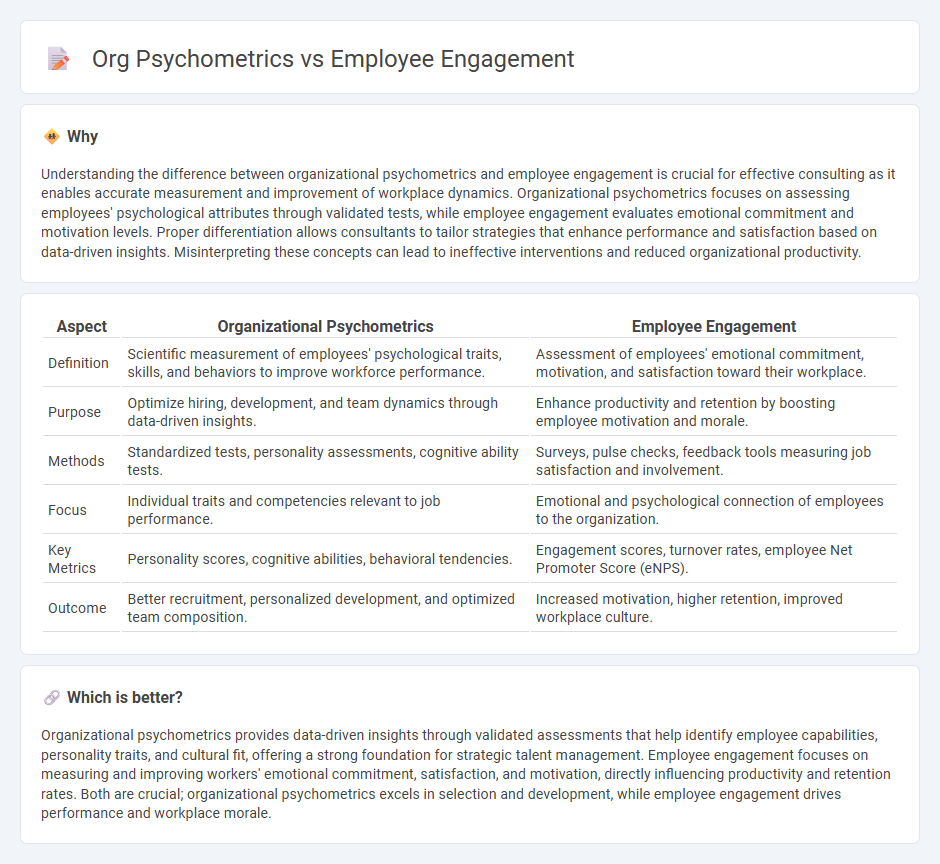
Organizational psychometrics leverages data-driven assessments to measure employee traits, behaviors, and cognitive abilities, providing precise insights into workforce dynamics. Employee engagement focuses on the emotional commitment and motivation of employees, directly impacting productivity, retention, and overall organizational performance. Explore the distinctions and applications of these approaches to enhance your consulting strategies effectively.
Why it is important
Understanding the difference between organizational psychometrics and employee engagement is crucial for effective consulting as it enables accurate measurement and improvement of workplace dynamics. Organizational psychometrics focuses on assessing employees' psychological attributes through validated tests, while employee engagement evaluates emotional commitment and motivation levels. Proper differentiation allows consultants to tailor strategies that enhance performance and satisfaction based on data-driven insights. Misinterpreting these concepts can lead to ineffective interventions and reduced organizational productivity.
Comparison Table
| Aspect | Organizational Psychometrics | Employee Engagement |
|---|---|---|
| Definition | Scientific measurement of employees' psychological traits, skills, and behaviors to improve workforce performance. | Assessment of employees' emotional commitment, motivation, and satisfaction toward their workplace. |
| Purpose | Optimize hiring, development, and team dynamics through data-driven insights. | Enhance productivity and retention by boosting employee motivation and morale. |
| Methods | Standardized tests, personality assessments, cognitive ability tests. | Surveys, pulse checks, feedback tools measuring job satisfaction and involvement. |
| Focus | Individual traits and competencies relevant to job performance. | Emotional and psychological connection of employees to the organization. |
| Key Metrics | Personality scores, cognitive abilities, behavioral tendencies. | Engagement scores, turnover rates, employee Net Promoter Score (eNPS). |
| Outcome | Better recruitment, personalized development, and optimized team composition. | Increased motivation, higher retention, improved workplace culture. |
Which is better?
Organizational psychometrics provides data-driven insights through validated assessments that help identify employee capabilities, personality traits, and cultural fit, offering a strong foundation for strategic talent management. Employee engagement focuses on measuring and improving workers' emotional commitment, satisfaction, and motivation, directly influencing productivity and retention rates. Both are crucial; organizational psychometrics excels in selection and development, while employee engagement drives performance and workplace morale.
Connection
Organizational psychometrics provides scientific measurement tools that assess employee behaviors, attitudes, and personality traits, which are crucial for understanding and enhancing employee engagement. Accurate psychometric assessments enable consultants to identify engagement drivers and potential disengagement factors within the workforce. Integrating these insights allows organizations to design targeted interventions that improve motivation, job satisfaction, and overall productivity.
Key Terms
Motivation
Employee engagement measures the level of enthusiasm and commitment employees feel towards their organization, while organizational psychometrics quantifies psychological traits and motivation factors driving workplace behavior. Motivation is a core component analyzed in org psychometrics to predict performance, job satisfaction, and retention rates. Discover how integrating psychometric insights can enhance employee motivation strategies tailored to your organization.
Assessment tools
Employee engagement assessment tools measure workforce motivation, job satisfaction, and commitment using surveys and pulse checks, providing actionable insights to boost productivity. Organizational psychometrics employs scientifically validated tests to evaluate cognitive abilities, personality traits, and behavioral competencies, enhancing talent acquisition and development strategies. Explore deeper insights to understand how these tools transform workforce management.
Retention
Employee engagement metrics directly correlate with retention rates by assessing job satisfaction, motivation, and commitment levels within an organization. Organizational psychometrics provide a deeper analysis of personality traits, cognitive abilities, and behavioral tendencies that predict employee performance and long-term fit. Explore how combining engagement data with psychometric insights can revolutionize your retention strategies and foster a loyal workforce.
Source and External Links
Why employee engagement is key to company success - Employee engagement drives long-term retention, higher performance, increased productivity by 18%, profitability by 23%, and reduces absenteeism by 78%, making it a vital strategic business objective.
How to Improve Employee Engagement in the Workplace - Engaged employees boost customer loyalty by 10%, productivity by up to 18%, profitability by 23%, and reduce absenteeism and turnover significantly while improving safety and quality.
What is Employee Engagement? (And How to Boost It) - Employee engagement increases productivity by 17%, lowers absenteeism by 41%, improves employee health, reduces workplace injuries by 70%, and strengthens trust in leadership and employer brand.
 dowidth.com
dowidth.com